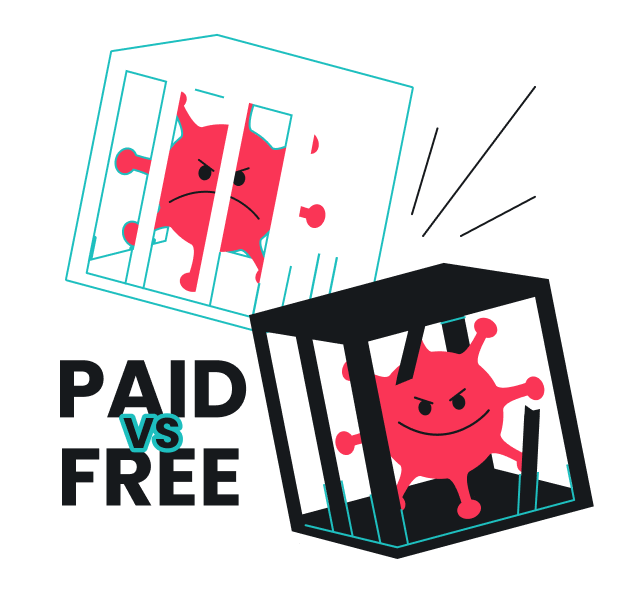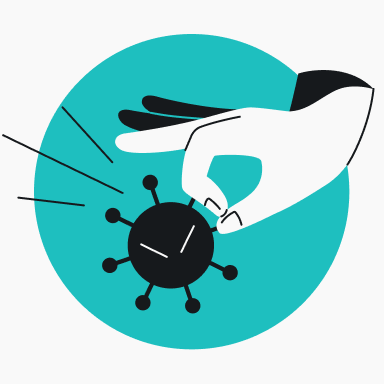Choosing the right antivirus solution is vital for protecting your devices from malware and other cyberthreats. With so many options available, it may be hard to determine whether free or paid software is better for you.
Continue reading this guide to explore the biggest differences between free vs. paid antivirus tools and see why investing in a paid solution is worth the extra security.
What is the difference between free and paid antivirus software?
The main difference between free and paid antivirus tools is that paid solutions generally offer more robust security. Most free programs only give basic protection, but a paid antivirus often includes advanced features like enhanced malware detection, customizable scans, and dedicated customer support.
Free antivirus features
While limited, free antivirus tools usually give users the following protection:
Malware detection and removal
An antivirus that can’t actually detect viruses is nothing more than a scam.
Malware detection is a basic function that any antivirus tool should provide. Free software can scan your device for the most common types of malicious software, bringing basic protection to your device.
Real-time malware prevention
A free antivirus solution should be able to stop new viruses from infecting your device through real-time protection. The software can actively scan newly downloaded files and installed programs to block malware before it can cause harm.
The depth of real-time protection might be limited, but it still gives users essential, around-the-clock defense.
Web protection
Many free antivirus programs include web protection features, such as browser extensions or built-in URL filtering. These help users avoid malicious websites and phishing scams.
While web protection in free versions is often less advanced than in paid suites, it provides a first line of defense when browsing online.
Network monitoring
Public Wi-Fi is riskier than your home or work network, so it’s a common target for hackers. Some free antivirus apps offer basic Wi-Fi protection features that help you identify unsafe or unsecured wireless networks.
These tools can alert you if you connect to a public or vulnerable network, reducing the risk of hackers intercepting your data. More advanced network security options, like firewalls, are usually reserved for paid versions, but basic Wi-Fi alerts still add an extra layer of safety.
Ransomware blocks
Ransomware — encrypting your files and demanding money to return them — is one of the main types of scams you need to look out for. That’s why most free antivirus programs protect your files from third parties.
This protection helps prevent common ransomware infections that try to lock your files and demand payment. However, more advanced ransomware protection, like the ability to restore encrypted files, typically only comes with paid apps.
Annoying notifications
Not all free antivirus features are good. Many users of free antivirus software complain about the overwhelming amount of notifications they receive nudging them to buy premium options. These pop-ups often warn of potential threats to create a constant sense of anxiety and urgency.
On the other hand, most paid tools provide robust security without constantly bombarding users with fear-mongering messages. They likely won’t force updates to questionable features or pressure you into purchasing unnecessary add-ons.
Paid antivirus features
Paid antivirus apps offer everything free antivirus software does and then some. Over the years, antivirus software has evolved to do much more than just detect malware.
Here are the extra features you should expect from a paid antivirus solution:
Database updates
If a piece of malware isn’t in your software’s virus database, you won’t be protected against it.
Paid tools typically have more expansive virus databases to protect your devices from a wider range of threats. Often including things like zero-day exploits, phishing sites, signatures, and heuristics, paid solutions are sometimes capable of tracking over 100 million potential threats.
Not only that, but a paid antivirus regularly updates its database to keep you safe from new and emerging malware threats. In contrast, free options are more likely to rely on outdated databases that aren’t frequently refreshed.
Cloud protection
Malware scans are effective against known threats that are already on your device, but cloud protection helps you take proactive measures against zero-day threats.
This feature lets you scan for unknown threats in the cloud — before they reach your device. It checks for suspicious files in real-time, keeping the newest viruses off your device without requiring access to any of your personal data.
Remote control prevention
Hackers can control your devices without being near them through remote access attacks. Paid antivirus tools protect against these hacks by ensuring that only you and authorized individuals can control your equipment.
Permanent deletion of infected files
Free tools may only hide or quarantine files that have been infected with malware. You’ve identified them, but you still have no way of fully removing them from your device.
On the other hand, a paid solution is much more effective at detecting, isolating, and permanently removing viruses. You can remove the guesswork and feel more confident that any malicious programs won’t see the light of day again.
Protection from phishing attacks
Leading antivirus services include on-demand protection against phishing emails. Features like Surfshark’s email scam checker can analyze the contents or sender information of the messages in your inbox to detect phishing patterns.
These tools then notify you if a given message is suspected to be a phishing email. With this information, you know to avoid clicking any links or downloading any attachments from these questionable emails. As a result, you’re less likely to fall into a trap and expose your device to malware.
Defense against camera hacks
Whether it’s a smartphone, tablet, or computer, any device with a camera can be the target of a webcam hack. The good news is that most paid antiviruses can stop hackers from spying through your own camera.
Tools like Surfshark Antivirus have built-in webcam protection that alerts you if any app or website tries to access your camera without your permission. You can even lock your camera for greater peace of mind.
Technical support
Paid antivirus apps often have a dedicated support team to walk you through any part of the removal process. If you find a bug, don’t know where to start, or are looking for general troubleshooting tips, you should have an online knowledge base and a team of experts to assist you and improve your product experience.
Note: When it comes to something like online privacy an antivirus won’t help much — that’s where a VPN (Virtual Private Network) comes in handy. Explore our VPN vs. antivirus blog post to see how these two tools stack up.
This list outlines the basics of what you can expect. That said, antivirus software companies offer additional features tailored to their clients’ needs. In general, there’s a good chance that any paid software will offer a lot more than free alternatives.
What are the risks of free antivirus software?
There are two main risks associated with a free antivirus:
1. Lack of additional safety features
Free antivirus tools are often purposefully bare-bones pieces of software that are missing many key functionalities.
To convince you to buy fuller versions, companies leave out certain types of scans and quality-of-life features. For instance, free tools may perform quick scans on demand, but full scans or cloud protection may only be available on paid versions.
2. Potential malware risks
While some free antivirus options come from established, reputable brands, scammers can also trick users into installing malware with free software that’s actually fake.
Hackers have been known to prey on uninformed audiences to push free downloads. These programs send bogus messages that they’ve found a malware infection — when they’re the source of the malware in the first place.
Things to consider when choosing an antivirus
When looking for the best antivirus, it helps to do some research. A good starting point is an in-depth antivirus review that shows how different products stack up.
In general, though, here are some factors to consider when choosing a good antivirus:
- Developer reputation: if any tool is made by a company with a shady history, it’s probably not the ideal solution for you. This factor is especially important when looking at free antivirus software.
- Basic features: does a specific tool have real-time defensive measures, preventative capabilities, and both quick and full scans? All of these basic features are a sign that you’re looking at a good antivirus solution.
- Platform support: some antivirus software only works on a single operating system. The overwhelming majority of malware attacks target Windows, so some tools might not work on macOS, Linux, or other platforms. Make sure the software you’re looking at is compatible with your preferred devices.
- Number of supported devices: paid antivirus services usually support more than one device per subscription, so you can protect all of your family’s devices with a single plan. A free antivirus will likely only support one device per account, offering limited protection overall.
- Additional features: when comparing different paid solutions, check out what advanced features each offers. Things like a ransomware shield, an external storage scanner, and multi-device protection can all provide greater security.
Key takeaway: should you pay for your antivirus?
Yes, you should use a paid antivirus tool instead of a free app. Antivirus software is essential, and paid options provide more robust, reliable protection than their free counterparts.
When it comes to paid tools, Surfshark Antivirus should be on your radar. Available in the Surfshark One and One+ bundles, Antivirus offers comprehensive detection, removal, and prevention. It’s also more affordable than other leading tools, making it a smart choice for budget-conscious users.
FAQ
Are paid antivirus apps better than Windows Defender?
Yes, the paid version of most antivirus tools is a better option than Windows Defender. Most paid software has more features and less bloatware than the built-in Windows Defender, so you’ll likely see better results with a smaller impact on system performance.
Is a free version of antivirus software enough?
No, free antivirus software doesn’t give you adequate protection. Although free tools can have some useful features, they’ll always offer limited defense when compared to paid alternatives.
Free antivirus companies usually don’t have the resources to react quickly to newer cyberthreats, so users will always be left more exposed.
Is paid antivirus worth it?
Yes, paid antivirus software is worth it. These tools typically come with a much bigger suite of security features to protect you from more than just simple malware.
Why shouldn’t I use a free antivirus?
You shouldn’t use a free antivirus because it’ll likely lack many basic features. Paid solutions usually have more security tools, so they’re able to offer more comprehensive protection.
Free antivirus software is often intentionally limited, and many free apps can be outright scams.
What is the best paid antivirus software?
There isn’t one best antivirus tool out there, as each user has their own unique experience. To help you decide which is the best option for your needs, look at our guides comparing Surfshark vs. Norton, Surfshark vs. Bitdefender, and Surfshark vs. Microsoft Defender.



